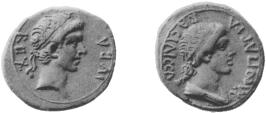You're right I had a little trouble with both ὑπομνημάτων and γέγραφε. I knew γέγραφε could mean wrote or published and ὑπομνημάτων, memoirs. What threw me was indeed δεκάτῳ. I though it was simply tenth, not tenth part (thus part infers a volume or book), so I somehow took a verb and made it a noun?
I'm not sure if you have a complete copy of Sulla. If not this is the complete thread from chapter 17:
περὶ ὧν οἱ μὲν ἐπιχώριοι πλείονα λέγουσιν· ὡς δὲ Σύλλας αὐτὸς ἐν δεκάτῳ τῶν ὑπομνημάτων γέγραφε, Κόϊντος Τίτιος, οὐκ ἀφανὴς ἀνὴρ τῶν ἐν τῇ ῾Ελλάδι πραγματευομένων, ἧκε πρὸς αὐτὸν ἤδη τὴν ἐν Χαιρωνείᾳ νενικηκότα μάχην, ἀπαγγέλλων ὅτι καὶ δευτέραν ὁ Τροφώνιος αὐτόθι μάχην καὶ νίκην προσημαίνει ἐντὸς ὀλίγου χρόνου.





 Reply With Quote
Reply With Quote







Bookmarks